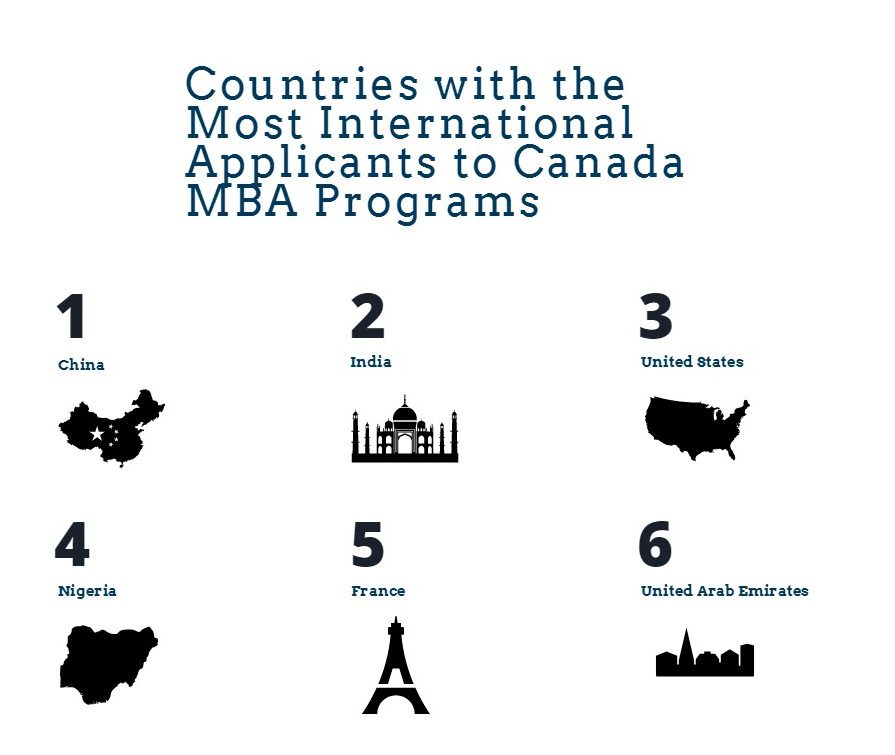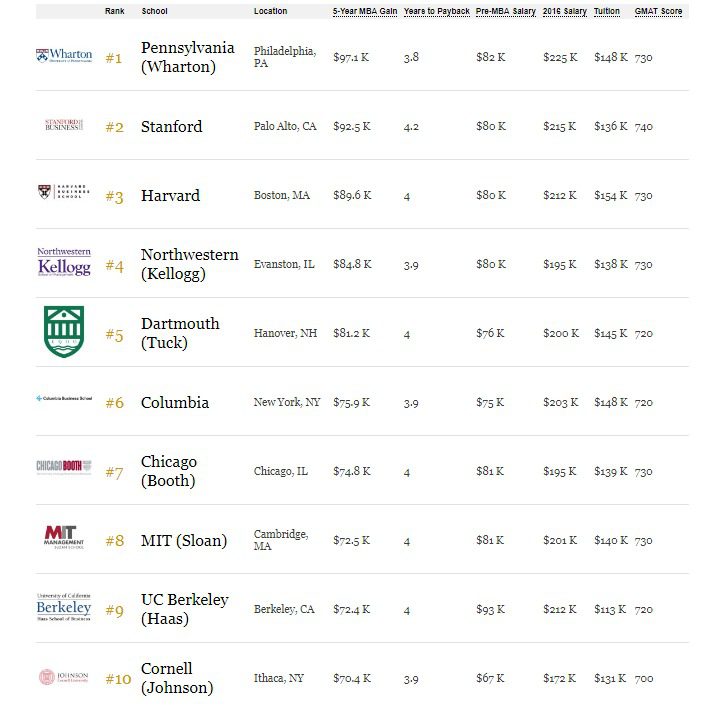Canada’s MBA Programs are Rising

The recent release of the GMAC 2017 Prospective Students Survey Report revealed some mixed revelations. While the status of smaller U.S. school MBA programs may be up in the air, international programs, particularly in Canada, are looking rosier than ever.
Overall, schools in Canada and Europe saw a 50 percent-plus increase in application volume from international candidates, of which GMAC speculates may be a result of political turmoil, particularly in the United States. This is a direct contrast from four years prior, in which less-than half of the Canada, UK, and other European business schools were seeing international applicant growth.
In the GMAC survey, an anonymous Canadian full-time MBA also noted, “The US presidential election has had a impact on our application numbers. Many international students choose Canada as their first choice.”
Niki da Silva, the Managing Director of the full-time MBA program at the Rotman School of Management at the University of Toronto, recently spoke with the Globe & Mail after the release of the report, saying, “This is our opportunity. We have to be anti-Canadian in this moment and really talk about what we are doing. We don’t tend to do that but we need to.”
By The Numbers
Results from the survey found subtle yet distinct differences between the international applicant pools in the major MBA location destinations.

In the United States, Europe, and Canada, according to GMAC, the two most prolific countries with international applicants were unilaterally India and China, which came in either first or second place for each region. However, for Canada, the remaining top 10 international countries with high applicant pools differed slightly from the U.S. and Europe, especially regarding Middle Eastern and North African countries. The United Arab Emirates (6th most), Tunisia (9th), and Iran (10th) were no where to be found in either the U.S. or European top ten.
Breaking the applicant pools down further, GMAC found an unsurprising correlation between the distribution of citizenship by application for Canada and the U.S. and the new data trends. After Europe, which had the most diverse applicant pool (a tricky stat since Europe is qualifying every country on the continent, while the U.S. and Canada are counted as singular entities), Canada had the world’s second biggest international pool of applicants, with less than 50 percent of Canadian business school students having official Canadian citizenship.
Domestic applications, in contrast, are actually down. But the international pool in Canada is swelling, creating substantial overall growth.
“International applicants comprised the vast majority of applications to business programs in Canada—64 percent of MBA applications and 88 percent of business master’s applications.” – GMAC
Gregg Schoenfeld, GMAC’s Director of Research, also noted upward trend for Canadian schools, saying, “This is the first time in the past five years that the majority, in fact three-quarters [of Canadian schools in the survey], are saying they are growing international volumes.”
“From a speculative point of view, it seems that the U.S. political climate has essentially driven candidates to Canada,” he continued.
YOU MIGHT ALSO LIKE: The Highest Starting Salaries for Toronto MBA Grads
The move to enroll more international applicants in Canadian schools started to emerge several years ago. Following lower periods of domestic enrollment, Canada’s MBA programs made a concerted effort to bring in more talent from abroad, creating a multi-year spring in growth that has not only benefited school enrollment, but fostered a positive international environment.
According to Global Affairs Canada, the result has been a positive economic boon as well. Upwards of 90,000 new jobs were created for Canadians just two years prior, while adding $10 billion to the country’s economy.
Tim Daus, Executive Director of the Canadian Federation of Business School Deans, previously noted that the trend was partly made possible because of the country’s flexible immigration policies, saying, “Canada’s visa requirements are much more flexible than other countries’, which gives us an edge. That makes a big difference for students who want to stay and work afterwards.”
Canadian Accolades
The substantial growth Canadian business schools have seen may not solely be the result of political overtones, rather, that many of the country’s best institutions only continue to improve.
The Schulich School of Business at York University in Toronto earned some hefty recognition from Forbes‘ recently released “Best Business Schools” global rankings, earning the 8th spot among the best international two-year program in the world. Schulich grads, Forbes claims, can expect a five-year net gain of over $48,000.
Last year’s Bloomberg BusinessWeek ranking of the best non-U.S. business schools also recognized both the Ivey Business School at Western Canada University and the Rotman School of Management among the top 25 programs in the world. Both the aforementioned Ivey and Rotman programs were recognized among the world’s 100 best by the Financial Times this year as well.
Wharton, Stanford Top Forbes’ 2017 Business School Ranking

For the first time ever, the Wharton School at the University of Pennsylvania topped the biennial Forbes list of the best business school’s in the United States.
Coming in second place on the Forbes 2017 rankings, revealed earlier today, was the Stanford Graduate School of Business, which was followed by Harvard Business School, Northwestern’s Kellogg School of Management, and Dartmouth’s Tuck School of Business rounding out the top five.

Forbes‘ top 10 U.S. business schools (2017)
Rounding out the top 20 were some familiar MetroMBA favorites, such as Columbia Business School (6th), Chicago Booth (7th), MIT Sloan (8th), UC Berkeley Haas (9th), UCLA Anderson (15th), the McCombs School of Business UT-Austin (17th), and the Mays Business School at Texas A&M (20th).
Just making the final cut on Forbes’ newest list, which includes only 70 schools, was the Fox School of Business at Temple University (60th), Pepperdine’s Graziadio School of Business and Management (65th), Northeastern’s D’Amore-McKim School of Business (66th), the Kogod School of Business at American University (67th), and the Gabelli School of Business at Fordham University.
Method To The Madness
Nearly every major publication that reveals its own respective business school ranking list has its own principle methodology in which it follows. For instance, unlike Forbes, the Financial Times ranking system relies more on alumni survey responses for its final ranking. While Forbes does utilize surveys in its ranking, its primary focus is on how graduates fare on their return on investment.
In the ranking release, Forbes staff writer Kurt Badenhausen notes:
“Our ranking of business schools is based on the return on investment achieved by the class of 2012. We examined more than 100 schools and reached out to 17,500 alumni around the globe. We compared graduates’ earnings in their first five years out of business school to their opportunity cost (two years of forgone compensation, tuition and required fees) to arrive at a five-year MBA gain, which is the basis for the final rank. Schools whose alumni had response rates below 15 percent or a negative return on investment after five years were eliminated.”
In regards to Wharton topping the 2017 list, Badenhausen writes, “These days most Wharton MBA students head to finance or consulting jobs upon graduation (79 percent of the class of 2012), which traditionally are the most lucrative areas for MBAs. The concentration in these sectors pushed Wharton’s current total compensation for the class of 2012 to the highest of any school in the world at $225,000.”
YOU MIGHT ALSO LIKE: The Highest MBA Salaries in Philadelphia
The exceptional cost of living around Stanford and shockingly low admissions rates (6 percent) contributed to the business school falling off its top spot from the prior year. Stanford GSB graduates, however, were given enormously valuable stock options after earning employment, with a median value of $380,000. Despite the astronomical figures, Stanford GSB grads still saw a dip of around $40,000 in total five-year compensation compared to the Class of 2010. Similarly, HBS grads saw a $28,000 five-year drop compared to the Class of 2010. Wharton 2012 grads, in contrast, gained $18,000 compared to two years prior.
In regards to employment, not much has changed since 2012. McKinsey and Co. was the top employer of the Wharton Class of 2012, hiring over 50 of the school’s 800-plus graduates. Alongside McKinsey were Bain, BCG, and Deloitte, which are still the school’s top employers. However, since then, Amazon has overtaken Goldman Sachs in the Wharton recruitment war.
Thomas Jueng, Seoul native and 2012 Wharton grad, tells Forbes, “Wharton was a great springboard to make a transition geographically and job position-wise with a strong brand name and network as well as providing practical knowledge.”
Read the entire Forbes list of the best U.S. business schools here.
George Washington School of Business Make Huge Splash in New Financial Times Online MBA Rankings

According to a press release on the school website, the Financial Times (FT) has listed the George Washington University School of Business online MBA program as No. 6 in the world in its 2017 survey of “Top 20 Online MBA Programmes.” Continue reading…
Booth Ranked 2nd In Latest U.S. News Part-Time MBA Rankings


According to the newest MBA program rankings from U.S. News & World Report, the University of Chicago Booth School of Business’ part-time MBA program came in ranked as the number two overall program in the nation. Continue reading…
GWSB Online MBA Program Ranked Highly By U.S. News



According to a press release, the George Washington University School of Business (GWSB) earned high marks for its online graduate programs in the latest U.S. News & World Report rankings. The newest ranking were released on January 10, 2017. Continue reading…
Bloomberg Ranks Rutgers MBA #1 in Job Placement


I was recently announced that Rutgers Business School recently placed first overall on Bloomberg Businessweek’s MBA job placement survey.
Continue reading…
